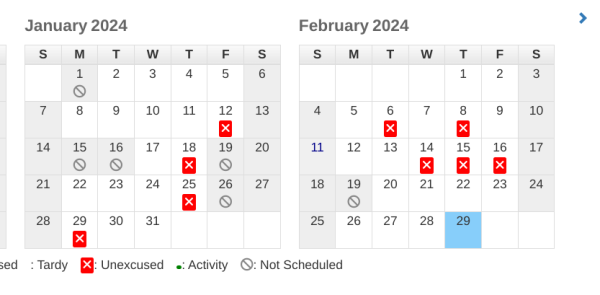Does a rolling gradebook kill hard deadlines?
The idea of a rolling gradebook, while extremely convenient, is also equally lax. With this, the existence of hard deadlines is brought into question.
Hard deadlines are fixed dates for when assignments are due. In contrast, soft deadlines are suggested due dates for assignments. Under a rolling gradebook, soft deadlines are most often used over hard deadlines.
So what’s the point of a hard deadline when there’s a rolling gradebook? Does a rolling gradebook kill hard deadlines?
Pun intended, a solid answer for this is hard to come by. The opinion of this could vary from teacher to teacher but let’s look at two perspectives.
“The rolling gradebook definitely has its advantages for both students and teachers,” English teacher Kathleen Mathis said. “Particularly I think for students it allows them to make up work that previously they would not have been able to turn in because of the way the grade book was set up previously.”
“I do think that it’s a detriment to students in some ways because it does not enforce the importance of deadlines,” Mathis said. She goes on to explain how when late work is turned in, students aren’t doing as thorough a job on completing their work. This is due in part to the fact that the material isn’t fresh and as such they’re less inclined to put effort compared to when it was relevant.
“It’s also difficult for teachers to then go back and grade something when they’ve already set aside a significant chunk of time to grade all of the assignments at once. It’s not fresh in teachers’ minds as well,” Mathis said. This also makes it hard for teachers to keep track of this late work when the rolling gradebook allows for this influx of late work.
She also took the time to reel back and mention the benefits of having a rolling gradebook in the context of summative assessments. In her mind, a rolling gradebook puts less stress on teachers towards the end of quarters when they are busy grading major summative assignments. It provides a larger, more flexible “turnaround” for teachers in the end.
Finally, Mathis was asked if she believed that a rolling gradebook killed the idea of a hard deadline. “100-percent,” said Mathis. “Deadlines are just so important and I think if we don’t emphasize meeting deadlines, students will face consequences in the real world for not meeting deadlines.”
This is a common opinion that you’d expect from teachers. Mixed but overall not inherently supportive of the idea as it does a poor job on preparing students for the future.
“It helps students get higher scores and itt helps them get confident that they can pass if they get behind,” English teacher William Maglisceau. “And I think it’s important to realize that the first quarter doesn’t necessarily make or break the second, third and fourth quarter.”
When asked about work ethic, Magliscaeu said that it impacts the way students worry about deadlines. “They have no problem missing assignments because they know I’ll still take them down the road,” Magliscaeu said. He also talked about the difference between students missing assignments for legitimate reasons versus the students who “know how to play school” in the scenario of a rolling gradebook.
Interestingly enough, however, Magliscaeu’s opinion took an unexpected turn.
“I just don’t think there are hard deadlines in life anymore,” said Maglisceau. “People are working from home, people are working at their own pace…to train kids for a life of having deadlines when there are no deadlines in life, to me, isn’t really a thing. Everything’s loose and soft, as far as the deadlines go.”
A fascinating point to think about moving forward.
The verdict in the end is concrete but mixed. While teachers do believe that rolling gradebooks are a detriment to the idea of hard deadlines, there are many benefits to it as well that makes school all the more easier.
As the pandemic rages on, the future of the rolling gradebook seems foggy. Who knows? As we transition into the new normal, perhaps we’ll take this with us too.

Senior Cal Carlos is in his first year of Journalism as a staff writer. Cal spends her time talking with friends, drawing, and writing. He thoroughly enjoys...







